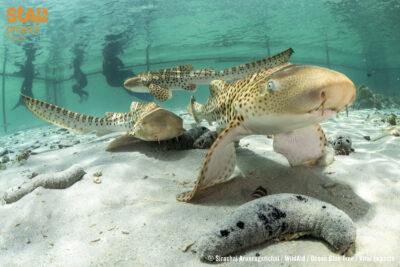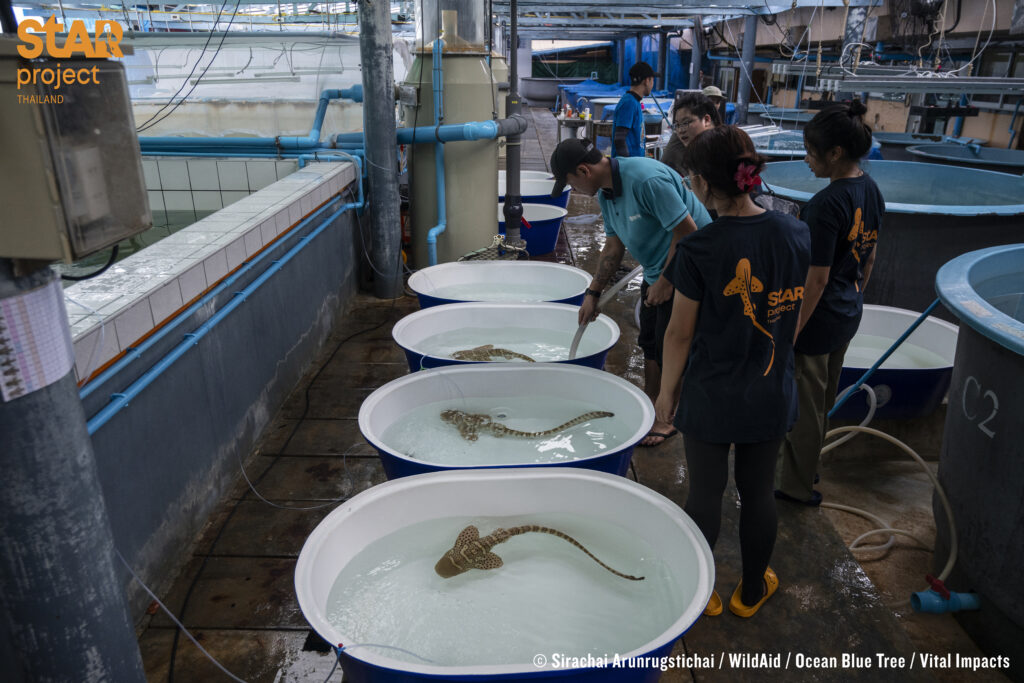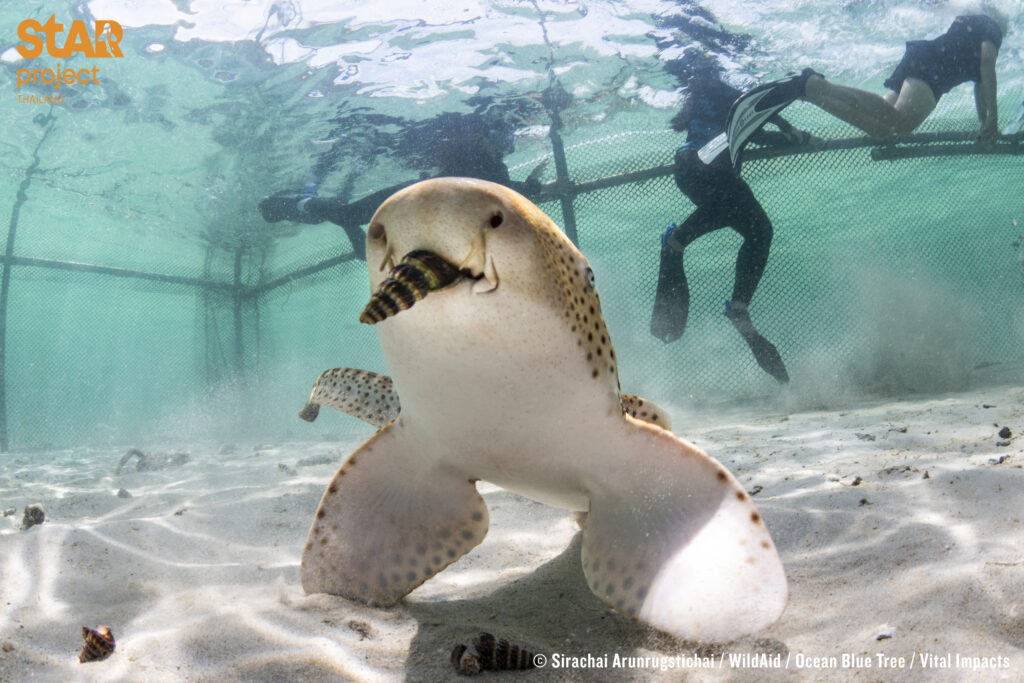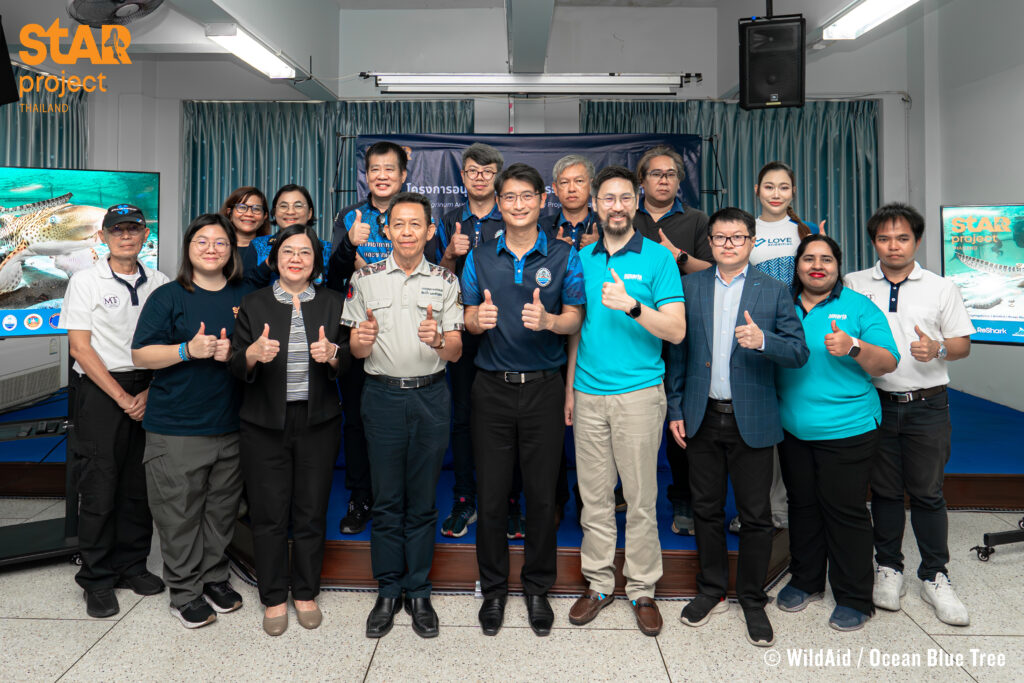


Nine Sharks Embark on Their Rewilding Journey
The first cohort of nine juvenile leopard sharks — bred by the expert aquarist team at Aquaria Phuket, part of the Aquawalk Group — has officially begun their rewilding journey. These young sharks, between two months and one year old, were recently transferred from the Phuket Marine Biological Center, under the DMCR, to a custom-built sea pen at Maiton Resort, located just off the southeast coast of Phuket Province.
This transitional habitat will serve as a kind of “rewilding school,” designed to help the sharks gradually acclimate to natural conditions while remaining in a safe and controlled environment. Over the coming months, aquarists will closely monitor the sharks’ behavior, encourage natural foraging by scattering and hiding food, and allow the sharks to interact with their environment — all to build the instincts they’ll need to survive in the wild.
“The DMCR has been actively monitoring leopard shark populations and has successfully advocated for their designation as a protected species in Thailand,” said Pinsak Suraswadi, Director-General of the DMCR. “In collaboration with partner organizations, we’ve raised hatchlings in captivity and trained them to adapt in sea pens modeled after natural environments.”
To ensure the long-term success of the StAR Project, the coalition is also conducting a Population Viability Analysis to forecast population trends, assess extinction risk, and inform science-based reintroduction plans. This includes identifying potential release sites, determining the number of sharks needed to support a stable wild population, and establishing post-release monitoring protocols.
In addition, genetic testing has confirmed that the parent sharks at Aquaria Phuket — the first facility in Thailand to successfully breed Indo-Pacific leopard sharks — share the same genetic strain as those historically found in Thai waters. This ensures the released population will support local genetic diversity and ecosystem integrity.


Long-term Government Commitments for Shark Recovery
Recently, WildAid and Ocean Blue Tree, as implementing partners of the StAR Project Thailand, led a workshop to build capacity in shark data collection techniques among three key government agencies: the DMCR, DNP, and DoF. This training reflects a broader commitment by project partners to expand conservation efforts beyond vulnerable species like the leopard shark, toward safeguarding entire ecosystems through stronger habitat protection and long-term monitoring.
That shift is already underway. The DNP and DoF are supporting the identification of future shark release sites and contributing to the development of post-release monitoring protocols. Area-based conservation is also gaining traction through initiatives like the Maya Shark Watch project — a collaboration between DNP and researchers from Thai Sharks and Rays — which has shown that when research is paired with effective habitat protection, shark populations can recover.
Next, the StAR Project will enter its second phase: tagging the nine juvenile leopard sharks before their initial release to allow scientists to track their movements in the wild. These efforts mark a promising step forward — not just for the recovery of an endangered species, but for the long-term resilience of Thailand’s marine ecosystems.


For media inquiries, please contact:
Metaveee Chuangcharoendee, Project Manager, StAR Project – Thailand, WildAid, Tel: +6681 8219612 | Email: metavee@wildaid.org
Nuthatai Chotechuang, Thailand Program Director, WildAid, Tel: +6681 818 9251 | Email: nuthatai@wildaid.org
Stay in touch and get the latest WildAid updates.
SIGN UP
